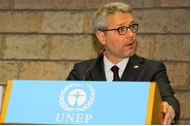Global Organizations to Expand Cooperation on Green Growth for Development
Governments looking to design and implement green growth policies and move towards a green economy now have a new source of information and assistance. Four leading global organizations today signed a Memorandum of Understanding to create the Green Growth Knowledge Platform, a cutting edge global initiative that will identify and address major knowledge gaps in green growth theory and practice. The agreement was signed by the Global Green Growth Institute, the Organisation for Economic Co-operation and Development, the United Nations Environment Programme, and the World Bank.
“This MoU marks the formal launch of essential international cooperation on testing, exploring, and refining policies and actions on green growth for practical implementation in both developed and developing countries,” said Richard Samans, Executive Director of the Global Green Growth Institute.
The coming decade will offer major opportunities for synergy between environmental and economic sustainability. For example, developing countries can factor “green” into their new investments in infrastructure and can further develop agriculture and other natural resources to improve livelihoods, create jobs, and reduce poverty.
“Governments seeking to re-ignite growth after the crisis,” said OECD Secretary-General Angel Gurría, “should harness innovation, investment, and entrepreneurship to drive the shift to greener economies. We must intensify our efforts to move towards green growth to preserve natural capital and reduce pollution. It will be essential to avoid path dependency by breaking old habits of consumption and investing in new technology and infrastructure. The Green Growth Knowledge Platform will be key for facilitating collaboration among our four institutions, to provide governments with the best possible tools to achieve this goal.”
The Green Growth Knowledge Platform will improve local, national, and global economic policy-making around the world by providing rigorous and relevant analysis of the various synergies and tradeoffs between the economy and the environment. It will complement other efforts by emphasizing policy instruments that yield local environmental co-benefits while stimulating growth, providing a compelling set of incentives for governments.
Original article published at www.uncsd2012.org

